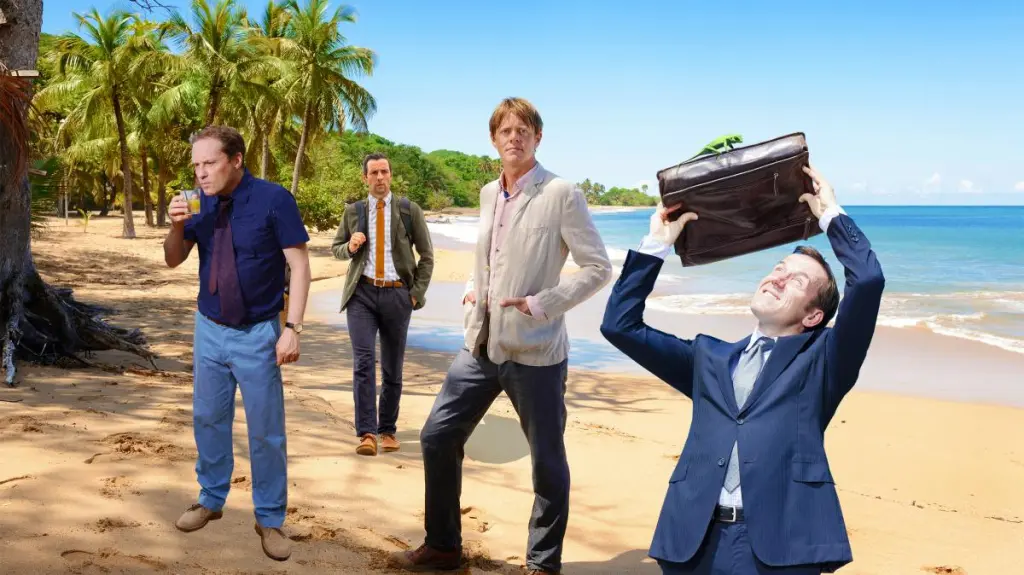
Someone is murdered in a paradise of sunlight-dappled waters and palm trees. It’s gruesome yet somehow scenic, somehow beautiful. The local constabulary is called in: an awkward and quintessentially British detective and his beautiful local partner. The pool of suspects is small. Everyone has an alibi. But after a small, random and unrelated incident, the brilliant detective pieces everything together and gathers all his suspects in one room for an Agatha Christie-inspired denouement whereupon the perpetrator inexplicably confesses.
Yes it’s that time of year when we can settle in to watch the mental fairy floss that is Death in Paradise: a sweet spun treat of almost nothing that dissolves from your brain as soon as it’s watched. The British detective show – now in its eleventh year – is the Hallmark Christmas film of January. A relaxing, untaxing and predictable watch. One that is gone as soon as you’ve pressed stop and therefore eminently open to rewatch.
Warning: This piece has (minor) spoilers for the Christmas special and the first part of Season 11
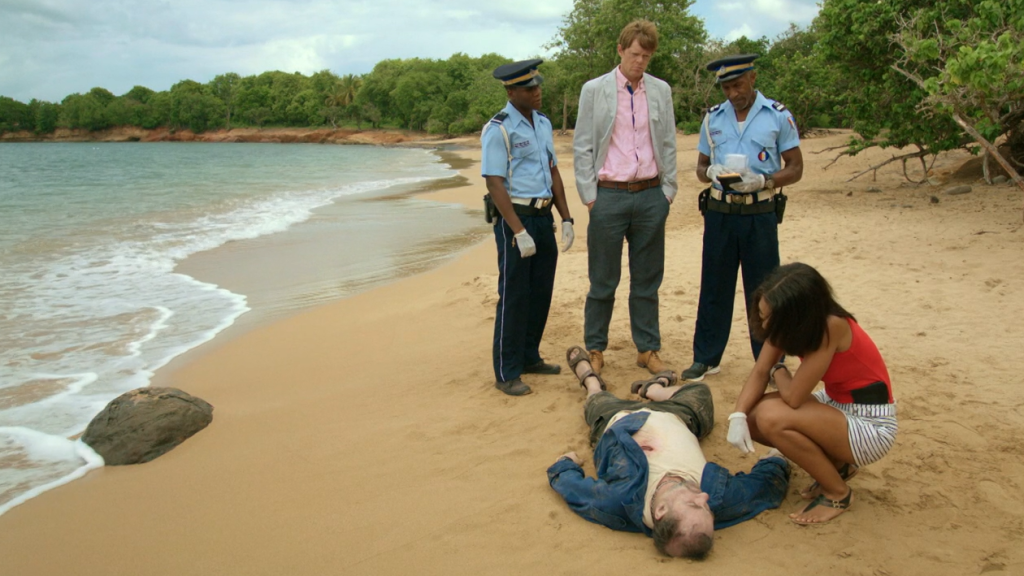
For British viewers it is a sunny fantasy in the depths of their winter. But the show has charm also for Antipodeans in their summer holidays before their year kicks into high gear. And with Covid entering year three, Death in Paradise adds another layer of fantasy: that of travel to distant climes where the pandemic does not exist and time is meaningless anyway.
This year, Death in Paradise got more than just an automatic twelfth season renewal. It also got a Christmas episode. With four British detectives (Ben Miller, Kris Marshall, Ardal O’Hanlon and Ralf Little) and a myriad of supporting characters, Death in Paradise has now been airing long enough to allow itself moments of nostalgia: such as Detective Sargeant Camille Bordey’s (Sara Martins) return to the show in Season 10 and Officer Dwayne Myers’ (Danny John-Jules) guest appearance in the Christmas special.
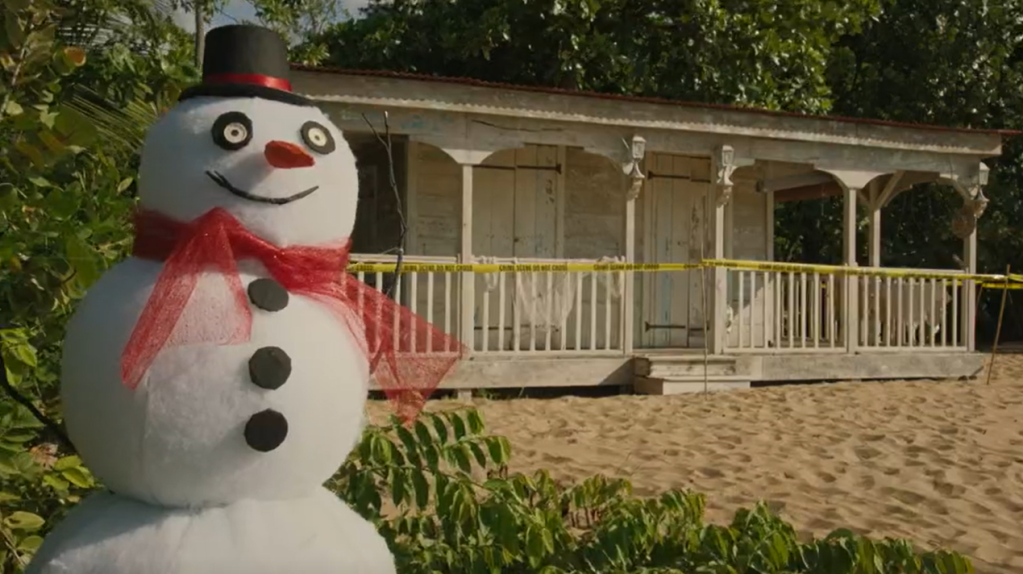
On paper, Death in Paradise could be seen to be… well… mediocre and even problematic. It was certainly panned by critics in its first year as Detective Inspector Richard Poole (a buttoned-up Ben Miller) came to the fictional island of Saint Marie to solve the murder of a British policeman and was forced to stay. The show had concerning White Saviour overtones with the brilliant white detective solving crimes no local could possibly hope to while flirting with his beautifully exotic black French subordinate.
Death in Paradise is the story of the British traveller, treading a bit too heavily upon the soils of someone else’s country. Part colonialism, part travelogue, our main character is essentially on a working holiday. A short stint in paradise; one where he can relax, throw off his past and potentially have a holiday romance. The exotic locale. The whiff of sex. Set it in Thailand and we could easily have an Australian version. I’d make the main character a journalist exiled to a fictional Phuket-style island but the show would be the same.
Away from the shackles of society, he can explore a new identity somewhere without consequences (at least for himself) and help a few of the natives while he’s there. In the end, he gets to go home.
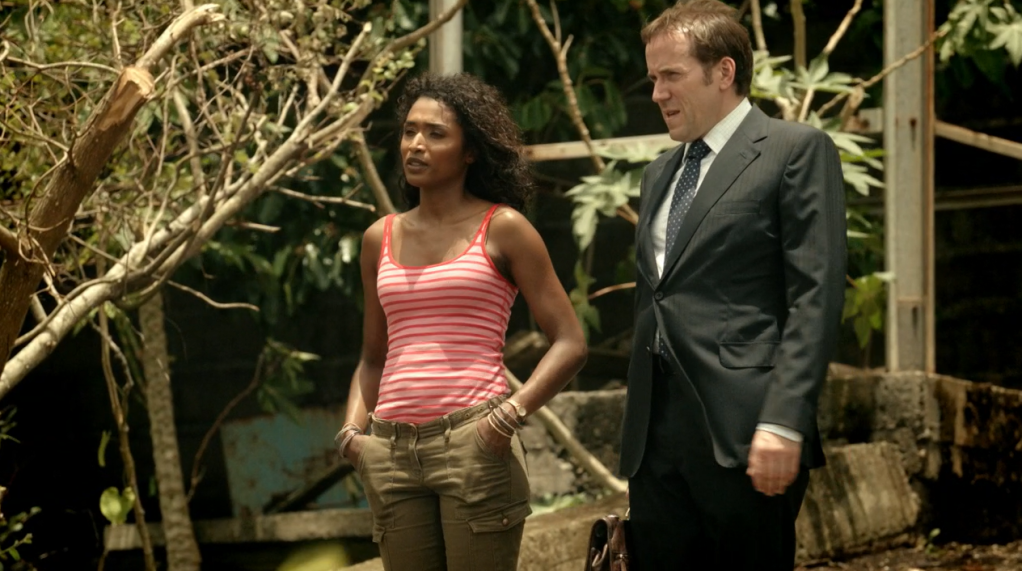
And yet, while we can look askance at the very obvious post-colonial issues here, the show’s self-awareness often saves it from its own potential pitfalls. It knows what it is and never allows itself to slump down to the depths of its genre. While the show has made some missteps along the way (plopping Kris Marshall’s DI Humphrey Goodman down into the same romance plotline conceived for the recently-deceased Richard Poole was a particularly bad call), the writer generally knows he’s treading a fine line and treads it with some deftness. The main character may have been parachuted in from England (or in one case Ireland) but the Commissioner of Police is not only a local but a canny political operator and brilliant detective in his own right.
Possibly more importantly, as the show has unfolded, our black female French offsider has been shown to be no mere romantic prize. Both Camille Bordey and more recently Florence Cassell (Joséphine Jobert) have their own aspirations and their own lives, both romantic and professional. The writing team has sharply course-corrected from their Season 3 mistake. DS Bordey left Saint Marie for a promotion, DS Cassell has spent several years grappling with the murder of her fiance Patrice and the way in which the trauma of that day has stopped her from moving on both in her personal life and her career. A romance between the bumbling but brilliant British Inspector and his local offsider has only recently resurfaced as a plotline and then it was done with a great deal of respect for her autonomy. DS Cassell simply said no.
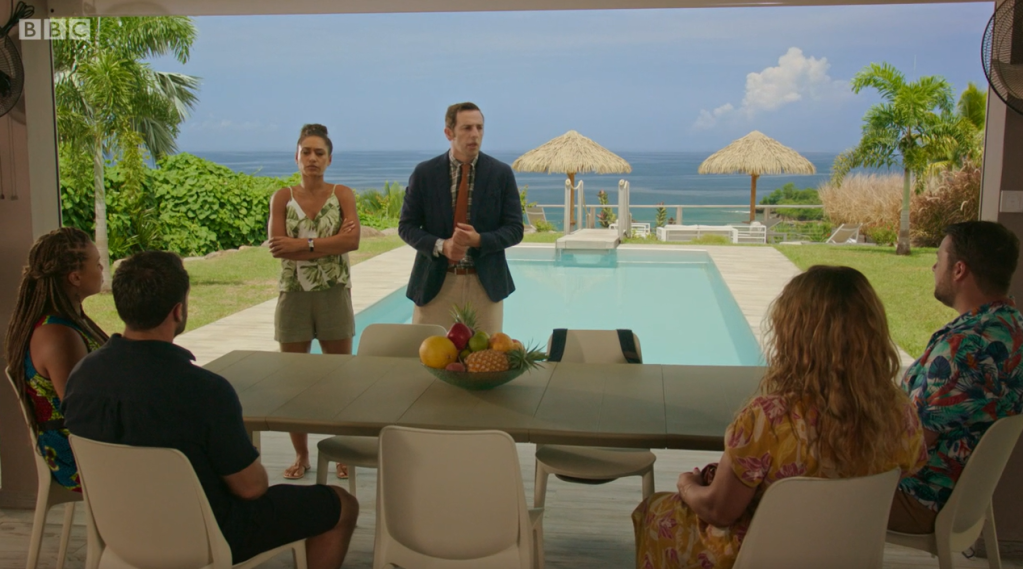
It is a truth universally acknowledged that the first two seasons of the show remain its finest. While never gaining critical acclaim, those two seasons had a freshness and an edge that has been ground down by a full decade of writing to a strict formula. Indeed, some of the later seasons have been particularly stale and the exit of third detective, DI Jack Mooney (Ardal O’Hanlon) was none too soon.
But while intensely formulaic, the show has had some character development. In a genre defined by its episodic and mimetic nature, it’s not surprising that character development is belated and in broad strokes – it’s more surprising that there is character development at all. And it’s not just for the white male lead. For the writer of Death in Paradise, his female characters are characters. While nobody in the show could be said to be particularly three-dimensional (many of the male lead’s quirks in his last three regenerations have been exactly that – quirks) all the characters at least are treated with respect.
While DS Bordey left the show in season 4, her mother, (local bar owner and future Mayor, Catherine Bordey) remained on the show. This means Death in Paradise has a truly rare beast – a single woman in her 60s who, despite being a mother, is not defined by being a mother. And as I’ve already mentioned, the resurgent romance plotline – now between DI Parker and his DS Florence Cassell – was characterised by an honest declaration and a firm rejection. Its a far cry from the average White Saviour narrative the show has previously toyed with.
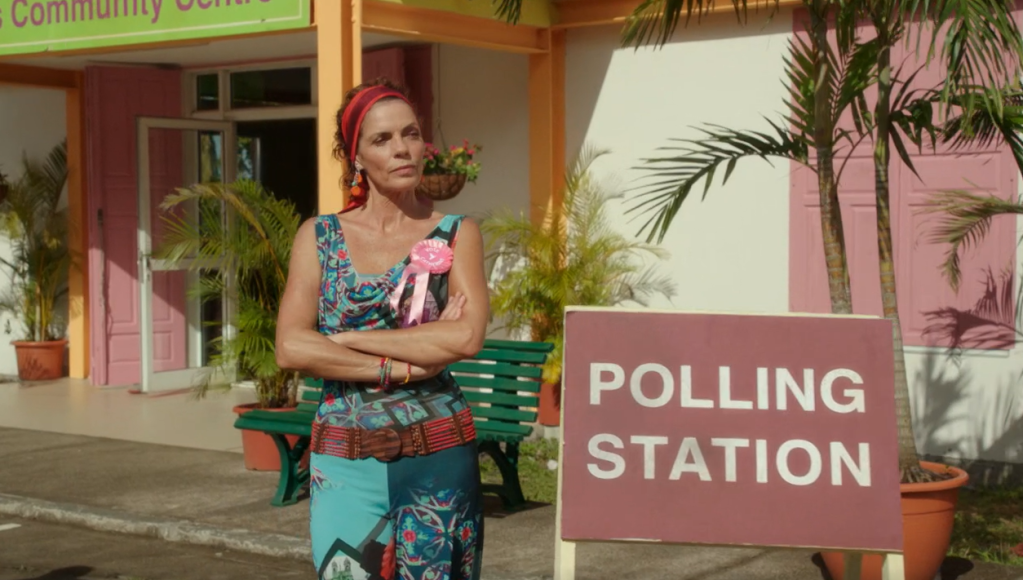
While each episode is underpinned by an often grisly murder, it has a lazy sun-drenched niceness to it that’s like taking a warm bath – or possibly sipping the cup of hot tea our first (and favourite?) detective was always seeking. To say that the first two seasons were edgier is like saying that Poirot is edgier than Miss Marple. It’s both true and yet marginal. Death in Paradise may have gotten a little rote, a little paint-by-numbers over its run but it was hardly groundbreaking to begin with.
In the end, it’s the show’s familiarity and sun-kissed simplicity that is its charm. It may have little substance but it’s a sweet treat that dissolves with the summer and can be indulged again next year.
Death in Paradise Season 10 is now streaming free to air for Australian viewers on ABC iview. Season 11 and the Christmas Special are available with subscription from Binge
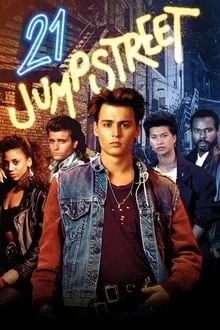
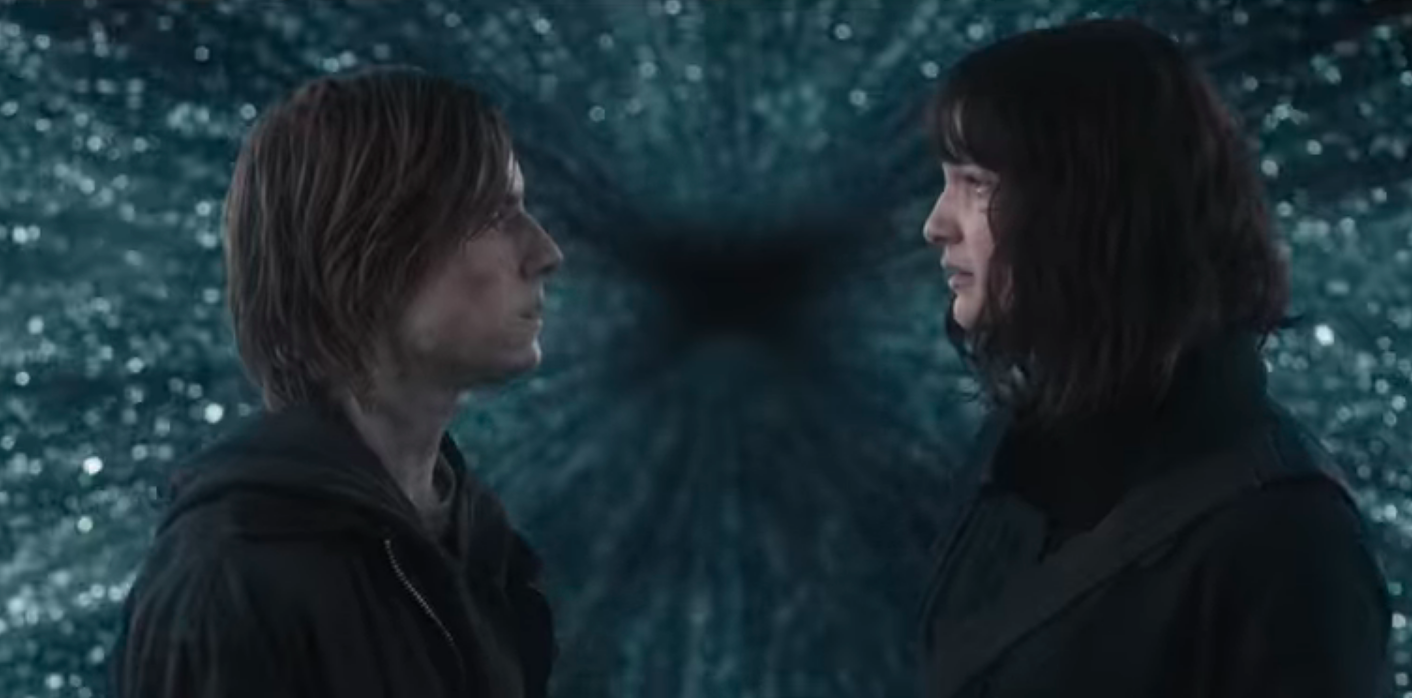


Well, we certainly like it 😊
As do I! My January wouldn’t be complete without it.
Death in Paradise is the beachy cozy murder mystery that could be banal but somehow manages to charm, and you’ve really nailed how they’ve kept it from going completely off the rails. Well, I’m trusting you because I’m still on season 2.
Britbox has a genre label that is “cozy murder” because as far as Brits are concerned, this is an actual thing and judging from Death in Paradise they’re right.